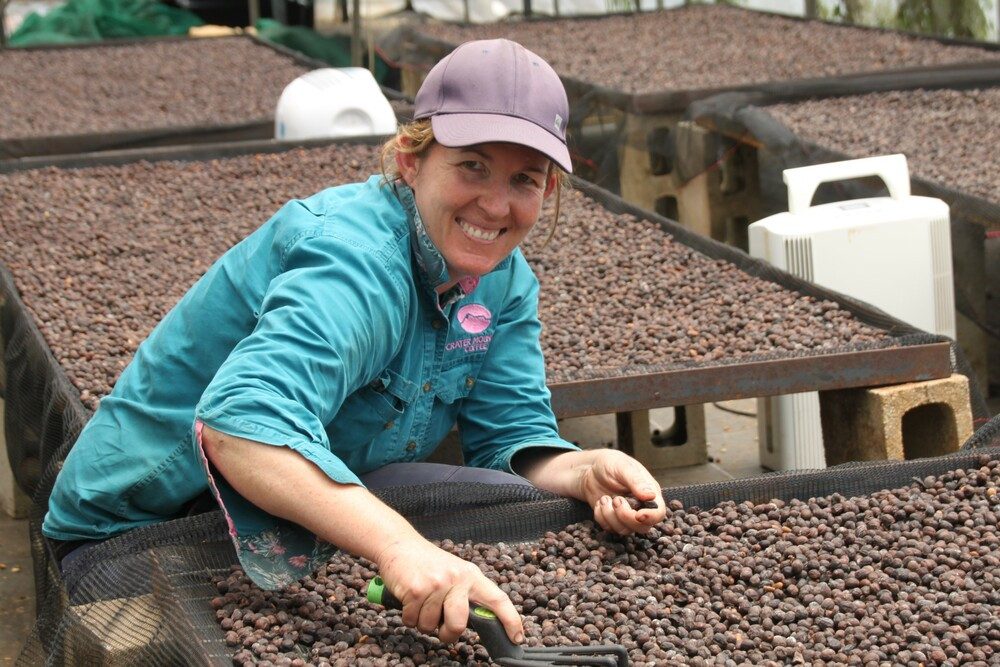General News
13 November, 2022
Crater Mountain coffee captures world's attention
Lucy Stocker's passion for what she does emanates even more strongly from her than the rich aroma of roasting coffee beans that usually surrounds her. Not content to just grow excellent coffee, she continues to push the boundaries of her craft, seeking new techniques and new markets for their product.

Lucy Stocker and James Masterman of Crater Mountain Coffee, Upper Barron have covered a lot of ground since choosing to leave their lives as mining engineers in Perth nearly five years ago and return home to set their agricultural vision in motion.
Last November, they were basking in the thrill of receiv-ing a bronze medal in the Filter category of the world's largest coffee roasting competition, the ‘Golden Bean,’ after putting their beans up for professional evaluation and blind tasting, against the world's best coffee growers.
Just one season on and their coffee has again featured in the international spotlight, when it was selected for inclusion in the 2022 World Barista Champion-ship and World Brewer's Cup, held in conjunction with the Melbourne International Coffee Expo.
The World Barista Championship (WBC) is the pre-eminent international coffee competition staged annually by World Coffee Events (WCE) and the story behind Crater Mountain Coffee being part of that championship is a cultural event in itself.
French rugby player and owner of coffee shops in the South of France, Tom Balerin was in Australia to represent Switzerland in the barista competition and need-ed a coffee to work with.
Lucy and James have established a collaboration with Australian specialty coffee roaster, Ona Coffee's flagship Melbourne store, supplying them with some of their mountain beans. Their brand was recommended to Mr Balerin, he loved it and chose to use it in the competition.
“He didn't make it to the final,” Lucy laughed
“But he took the left over coffee from the competition back with him to promote in France and hopefully to begin retailing through his own coffee shops in France's most popular tourist region.”
Meanwhile, Crater Mountain Coffee is being sold for $14 a cup in Canberra's Highroad coffee shop, another of Ona's national flagship cafes where coffee takes centre stage and is served in an endless array of brew methods of multiple origins and flavours.
“We made a conscious decision to align our product with the ‘third wave of coffee’ connoisseurship, whose subscribers consider coffee an artisanal food, like wine,” Lucy said.
“They want high quality coffee sourced from farms instead of countries. Their drinking experience is enhanced by in-creased knowledge of the coffee's uniqueness, including its source (cultivar), and its growing, harvesting, roasting and preparation methods.
“Our crop is completely hand harvested, sorted and processed. Our roasting process is about bringing out the unique characteristics of each bean, and the flavor is clean, hard and pure.”
Currently wrapping up this season's harvest, Lucy has been heavily involved with Danish bioscience company, Chr.Hansen, one of the world's largest suppliers of food cultures, probiotics, and enzymes to the wine, beer and dairy industries.
As one of the test farms involved with Chr.Hansen, Lucy is conducting 50 different trials in a bid to create new flavours in their coffees. After pulping, coffee beans are fermented for three to six days using wine or champagne bacteria to react with the beans' enzymes and bring out their fruity flavours.
Next they are dried in the green house at 40-45 degrees for 20 days before being de-skinned to release the green bean. Then they are rested for a couple of months before being sent away to Canberra for tasting assessments.
Every bean has been tracked using QR codes from the moment it entered the processing shed, to the point of cupping.
Delayed by drizzle, this year's harvest had to be crammed into a two-week window. The 10 tonnes of cherry harvested is all destined for the specialty coffee market and Lucy said they were aiming to achieve the rarely attained 90-point average and $200/kg product range.
“Next year we want to step up in scale and efficiency, lifting our 7,000 trees to around 30,000 trees, gradually expanding until we are reach 100 per cent capacity on our 142ha Upper Barron property by 2025,” she said.
“Traditionally an online business, we have started supplying local outlets, where people can ask specifically for our brand. We run Farm Open Days, including a farm tour and cupping on the first Sunday of the month.
“But with the harvest done and the last barrel of ferment in the drying room, I am getting sick of falling over the coffee stacked everywhere. I am look-ing forward to going and lay-ing in the ocean for a week and daydreaming about our next big achievement in the global coffee scene.”


